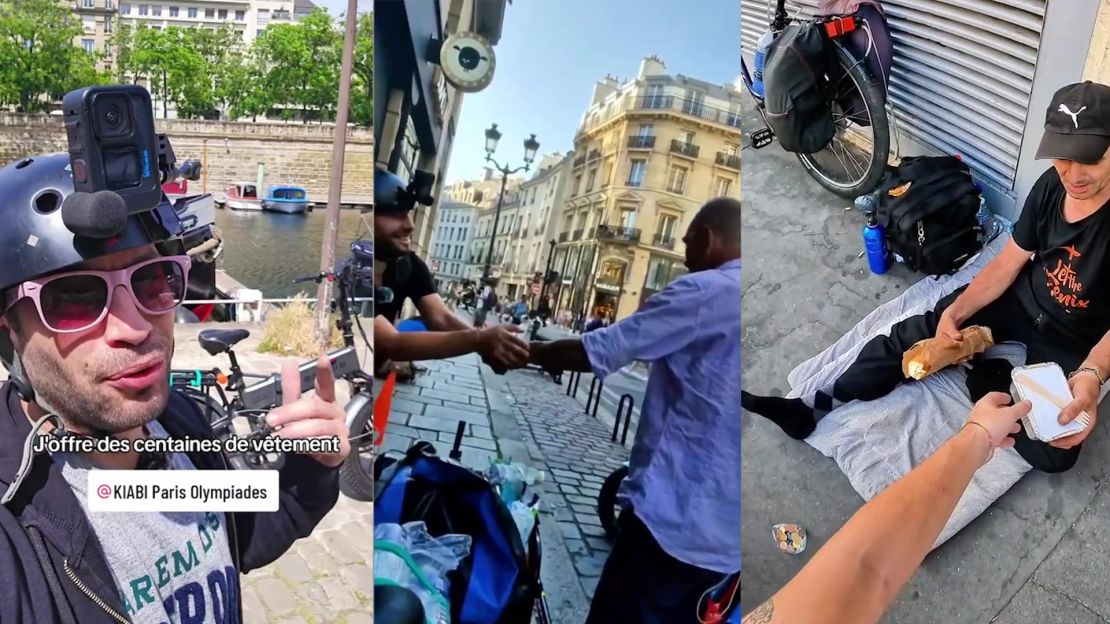Manu Solidaire is quick to admit that he is not a real chef. Yet the cooking livestreams that he broadcasts from his tiny Paris apartment have attracted a huge audience on TikTok. They aren’t watching to see complicated cooking techniques; it’s his generosity that’s on full display.
The 33-year-old spends hours preparing dozens of meals before hopping on his bike and distributing the food to people living on the streets of Paris. Solidaire takes his online audience along every step of the way.
“When I wake up in the morning,” he said, “I’m thinking about, ‘What do I want to make today?’”
From prep to packaging, Solidaire’s cooking sessions last four to eight hours. His kitchen is only about 30 square feet, so there is little room for others to keep him company. Instead, he often has an audience of thousands interacting online in a party-like atmosphere.
“We laugh, we dance, we move, we are like a family on the live session,” he said.

When Solidaire first began delivering his meals in 2022, he said that he wore a GoPro camera on his bike helmet for his own security. After a few months, he started asking people if they would mind being in his videos. He says he uses these videos to change perceptions around homelessness.
“It’s to show to the world some homeless people … they work all their lives and right now they have some problems,” he said. “And maybe you can understand their situation.”
Solidaire’s TikTok account has 352,400 followers and 5.6 million likes. His social media audience helps fund his efforts through links on the account and by donating during his livestreams. Last year, Solidaire won TikTok’s L’award d’honneur for his work.
Solidaire first got to know people experiencing homelessness when he was running a pair of e-cigarette businesses. He would allow people in need to charge their phones in his store and would offer free coffee. Then, during the pandemic, he says “the business decreased, and the happiness decreased, too.”
“I was thinking, ‘I have to find a new way to be happy,’” he said.
One day, he made pasta for his family and had three portions leftover. He spent 20 minutes walking the streets and found three people who would not have eaten had he not offered the meals.
“I come back home with a really huge smile,” he said. “It’s good for me and good for them.”
Solidaire found a new mission and started up his TikTok livestreams hoping to share recipes and sharpen his cooking skills.
His first deliveries proved that he had some lessons to learn. When he would approach people, he said they did not know what to make of a stranger alone on his bike saying, “Hello, are you hungry? I have free food.” Then he realized, “’Manu, did you really ask about homeless people if [they] are hungry?’ Sure, [they] are hungry.” So, Solidaire changed his approach, instead saying, “I deliver free food for you. Do you need it?” He found people were far more accepting of his offer.

When he saw that their needs went beyond food, he began distributing hygiene supplies. He also sometimes offers to pay for hotel rooms.
Now, with the world’s eyes on Paris for the Olympic Games, many homeless people have been moved out of the city. Solidaire says he fears that the government is sending them to areas where they have no connection or resources. He argues this does not solve the underlying problems.
“We can’t just hide the poverty of the country without any solution,” Solidaire said, adamant that he will still feed the people who depend on him. “If I can’t find them on the streets … I will take the train to continue to deliver my food.”
One thing hasn’t changed for Solidaire since the first pasta meal he gave away: the joy that this work brings.
“When I see the smile I (get) on the street, when I see the smiles I have (doing this), and when I see the smiles (from) my followers … thank you for that.”


